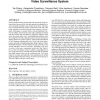Free Online Productivity Tools
i2Speak
i2Symbol
i2OCR
iTex2Img
iWeb2Print
iWeb2Shot
i2Type
iPdf2Split
iPdf2Merge
i2Bopomofo
i2Arabic
i2Style
i2Image
i2PDF
iLatex2Rtf
Sci2ools
189
click to vote
MOBICOM
2015
ACM
2015
ACM
The Design and Implementation of a Wireless Video Surveillance System
Internet-enabled cameras pervade daily life, generating a huge amount of data, but most of the video they generate is transmitted over wires and analyzed offline with a human in the loop. The ubiquity of cameras limits the amount of video that can be sent to the cloud, especially on wireless networks where capacity is at a premium. In this paper, we present Vigil, a real-time distributed wireless surveillance system that leverages edge computing to support real-time tracking and surveillance in enterprise campuses, retail stores, and across smart cities. Vigil intelligently partitions video processing between edge computing nodes co-located with cameras and the cloud to save wireless capacity, which can then be dedicated to Wi-Fi hotspots, offsetting their cost. Novel video frame prioritization and traffic scheduling algorithms further optimize Vigil’s bandwidth utilization. We have deployed Vigil across three sites in both whitespace and Wi-Fi networks. Depending on the level of ...
Related Content
| Added | 14 Apr 2016 |
| Updated | 14 Apr 2016 |
| Type | Journal |
| Year | 2015 |
| Where | MOBICOM |
| Authors | Tan Zhang, Aakanksha Chowdhery, Paramvir Bahl, Kyle Jamieson, Suman Banerjee |
Comments (0)

